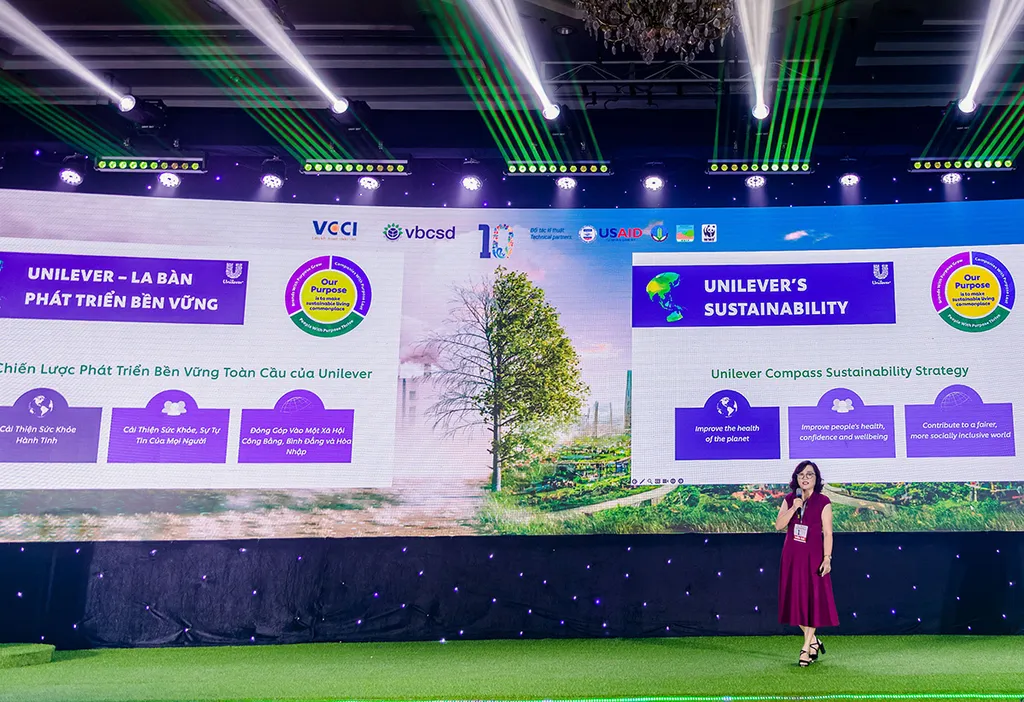 advertisement
advertisement

 |
| Ms. Le Thi Hong Nhi, Head of Communications, Corporate Affairs and Sustainability of Unilever Vietnam, shared about Unilever green growth strategy at the Vietnam Corporate Sustainability Forum (VCSF) 2023. — Photo courtesy of Unilever Vietnam |
With the alarming global climate situation, green transformation has become a key priority - an inevitable pathway for most nations and enterprises around the world.
The latest data from the "Global Climate Status 2021" report shows that the global sea level has reached a new record, accompanied by ocean warming and acidification.
According to a report from the United Nations in 2018, scientists and experts agreed that keeping global temperatures from rising 1.5oC is an important target to avoid the worst impacts of climate change.
Many governments and international organisations have taken strong measures to cope with environmental pollution and climate change.
At the 26th United Nations Climate Change Conference of the Parties (COP26) held in December 2021, 150 countries, including Việt Nam, made strong commitments to achieve net-zero emissions by 2050.
The Vietnamese government has embraced a green growth roadmap, transitioning to low-emission agriculture, industry, production, and consumption.
To achieve optimal effectiveness, it requires synchronised involvement from local authorities, communities, and businesses.
As part of this effort, Unilever is reducing emissions from all operating activities as a FMCG company.
To achieve this goal, the company has implemented a comprehensive approach - green transformation throughout its value chain.
Ms. Lê Thị Hồng Nhi, Head of Communications, Corporate Affairs and Sustainability of Unilever Vietnam, said Unilever Vietnam is committed to building a “net - zero value chain” as the core of the company’s sustainable business model.
“In fact, we have been at the forefront of achieving zero emissions in our operations since 2021,” she said.
Unilever Vietnam has switched from fossil fuels (diesel) to clean and renewable energy and improved energy efficiency.
All the fuel used for operating steam boilers in Unilever factories nationwide has been transitioned to biomass pellets made from recycled agricultural by-products such as wood and rice husks.
This initiative has eliminated an average of nearly 10,000 tonnes of CO2 emissions per year since 2007 and saved hundreds of thousands of euros annually.
Unilever has also received International Renewable Energy Certificates (I-RECs) for electricity used in all factories, offices and distribution centres, certifying it as 100 per cent renewable energy.
In coordination with the Ministry of Natural Resources and Environment since 2021, the company has committed to planting one million trees in national parks and protective forests.
It is keeping plastic in the loop by making more of its products fully recyclable and using more recycled plastic in its packaging.
It has set a target for all Unilever plastic packaging to be recyclable by 2025, reducing the use of virgin plastic by half in packaging production, increasing the use of recycled plastic, and collecting and processing more plastic waste than the amount of packaging sold.
Unilever has initiated the public-private partnerships (PPC) with the Ministry of Natural Resources and Environment since 2020, implementing various initiatives in sustainable plastic waste management through a circular economy model.
The company has achieved the milestone of reducing over 50 per cent of virgin plastic used in packaging, 63 per cent recyclable packaging, collecting and processing over 20,000 tonnes of plastic waste, supporting livelihoods and improving hygiene, occupational safety, and social welfare for over 2,500 female informal waste collectors.
Its green transformation journey has achieved dual goals of business growth and environmental protection.
That creates a positive social impact, contributes to the realisation of Unilever's global sustainability targets of improving the health of the planet, as well as contributing to a fairer and more socially inclusive world.




